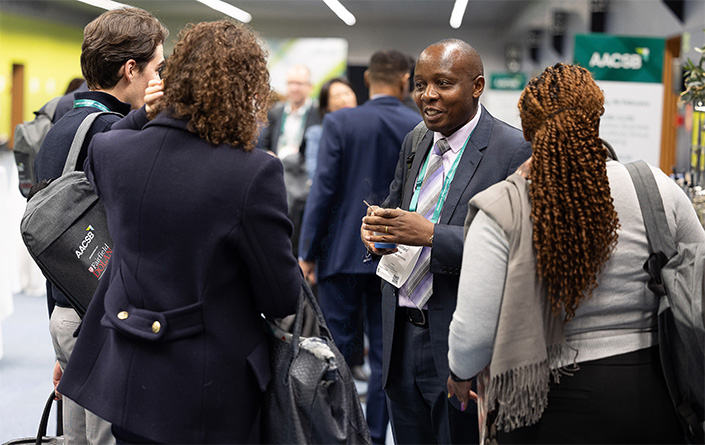The Business School Role in Inclusive Leadership | AACSB
Transcript
Geoff Perry: [0:13] Good morning, Nick.
Nick Wailes: [0:16] Morning, Geoff.
Perry: [0:18] I know recently that you and your colleagues at AGSM, New South Wales, have been involved in work on diversity and inclusion, its benefits for organizations and for business schools, but also analyzing some of the implementation issues. This is really an important issue. There's research and initiatives around the world looking at this.
[0:43] Given the importance of the area or diversity and inclusion and the work that you'll be doing, it would be great to have this opportunity to explore with you some of the aspects around that.
Wailes: [0:56] Sure. Always delighted to talk about this issue. I think it's a really important contemporary business issue.
Perry: [1:03] What, in fact, does it mean to have an inclusive mindset? How is business education today helping to develop that in our awareness?
Wailes: [1:13] Geoff, that's a great question, and one that all leaders need to be thinking about. If I think about the situation that business leaders have is that their primary responsibility is to unlock all of the talents that they have at their disposal to achieve their business aims.
[1:32] One of those resources is the diversity of their organization, the diversity of their workforce, but if you can't create an inclusive environment, you can't benefit from that diversity. An inclusive mindset is looking for what are all the different ways that I can act and I can set up structures in my organization that allow me to benefit from the diversity that I have at my disposal.
[1:56] Business education, we've got a huge role to play in that. I see us as effectively helping to create the next generation of leaders who are going to have to manage businesses and organizations through what is going to be an increasingly challenging time, so they're going to need all the skills they can get.
[2:15] For us, there are probably three things that I'd point to that business education can contribute here. Firstly, we can contribute by influencing who's in the classroom. Having the diversity in the classroom and that diversity of thought and diversity of background will help craft those leaders because it gives them the opportunity.
[2:38] That's about looking at your recruitment policies, looking at all the initiatives you have to ensure that you're getting the best possible people regardless of the backgrounds that they're coming from. That's an important challenge for all of us and something that we should all be doing.
[2:54] Second is there's a skill set around being inclusive that doesn't necessarily come natural to people. We know from all the research that people prefer to work with people who are like them and they find decision making easier if you've got the same background. We know from research on recruitment that left to your own devices, you'll tend to recruit someone who's just like you.
[3:19] Working with people who are like you might be comfortable and it might feel easy, but the key thing about that is it doesn't necessarily result in better outcomes or optimal business decisions.
[3:31] We know that a group that's very homogenous with a limited range of views will tend to narrow in on one or two solutions, whereas a group that's diverse and has a range of different experiences will tend to identify a whole range of possibilities. Having 2 answers to a question or having 10 potential answers to a question, I would always choose the 10 because you're likely to end up with a better result.
[3:57] The third thing that business education can contribute here is setting challenges that require inclusive thinking. There's been a revolution in management education away from very technical assessment where you want the answer to a calculation through to assessments and ways of testing people that require them to think and bring in a range of different perspectives.
[4:24] The more that we move that curriculum to authentic problem based solving, experiential learning, those things where you actually need a diversity of opinions and you need to be able to integrate those, that just helps you develop an inclusive mindset because you realize that you can't come up with a great answer to that question unless you're leveraging all of the different perspectives in it.
[4:47] We have a critical role to play.
Perry: [4:49] That's interesting. It picks up on the needs for people now and in the future when they go into the workforce and into society, and the curriculum in business schools needs to reflect that. By including diversity and inclusion, you're enabling that. That's a powerful point.
[5:06] There are a number of ways that business schools can improve what they're doing in the diversity and inclusion space. To what extent are business schools currently good models of diversity and inclusion? What things are they doing currently that are really effective in that area?
Wailes: [5:25] It's a good question. I'd say the answer is that there's some way to go for all of us. There are some great initiatives going on in lots of different schools, and people have embraced this issue. I can't point to one and say that's the gold standard and they've done everything they need to do.
[5:41] Most organizations that are on this journey will also tell you that it's a process, and it's an ongoing journey, and they need to keep working on it.
[5:51] There are probably two or three things that I see business schools doing really well that are positive signs. One is the composition of the student body. There are a lot of initiatives to enhance the diversity of the composition of the student body and to include underrepresented groups.
[6:11] At AGSM, for example, we have Global Female Leadership scholarships that bring outstanding female talent into our programs. We've got scholarships for leaders from the LGBTIQ community. We work quite closely increasing opportunities for indigenous Australians to come into our program. Many schools have got those type of initiatives.
[6:33] A second initiative which I think is really positive is changing who's teaching the class. Thinking about who your faculty is. You want to reflect the diversity of the society you're in, not just in your student body but also in also in your faculty.
[6:50] Looking for opportunities to increase the gender balance in your faculty, but also consciously thinking about the cultural or linguistic diversity of that faculty body. That's developing.
[7:04] Probably a hallmark of good MBA programs all around the world and good management education all around the world is it's not just what you learn about technical things or subjects, but it's what you learn about yourself that is a real core element of a successful program.
[7:20] Many programs have opportunities for you to think about what are your strengths as a leader, but also what are your opportunities for development. I think that becoming an inclusive leader starts with understanding yourself and where you can develop, and what you need to work on. I see those elements integrated into programs, and I think that's really positive.
[7:44] The other things, which may sound simple but I think are important, is increasing use of guidelines or inclusive language in the classroom and beyond. That might sound simple, but I can remember back to a finance class that I took, and the professor would say, "OK guys, we're now going to look at this problem."
[8:09] I think he thought he was being familial, but what he was effectively doing was excluding a third of the class. Just pointing that out to faculty and making that one of the hallmarks of how you operate, you think about those things and you don't deliberately try to exclude people.
[8:27] Probably the fourth thing that business schools do really well is those business schools that bring senior executives and leaders into their programs through seminar series or as guest lecturers. This issue about diversity and inclusion is top of mind for all senior leaders in most large organizations.
[8:47] We never have a senior executive that doesn't make that one of their key leading points and about what they're thinking about leadership. Being really clear about that this is not a nice to have issue, but it's a core business issue that you need to think about really helps set the tone.





